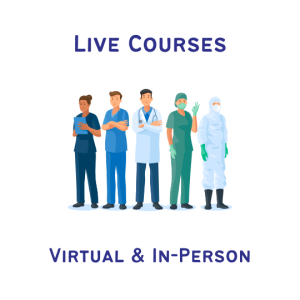
Published June 16, 2023 | Updated August 17, 2023
By Niladri Dutta
Fueled by intuition, with an unwavering passion for Medicine, he currently thrives in a high-pressure environment in ED. Off-duty, catch him smashing boundaries on the cricket field, tackling opponents on the football pitch, or exploring the globe, seeking new adventures to feed his soul.
Picture this: You’re a Junior doctor beginning your first-ever shift in the Acute Medical Unit, faced with a patient in shock who’s in urgent need of an IV cannulation.
You have given it a shot, but it did not work out. Now, the patient is beginning to grow apprehensive, and as a result, a variety of thoughts are currently running through your head.
You are feeling nervous, your hands are trembling, and your heart is racing.
Is there a possibility of discovering an additional vein? Would you prefer to exacerbate this patient’s agony? Can you keep your composure during this crucial moment? You may have mastered the basics of the procedure while in medical school.
What about the mental aspects of the procedure; How do you deal with the anxiety and uncertainty that often accompany having to insert a needle into someone’s vein?
When it comes to IV cannulations, mental preparation is equally as crucial as technical skills. Whether you are a junior doctor in need of emotional support or a medical professional interested in providing it, read on to learn about the often-overlooked topic of emotional support for junior doctors and how it can make all the difference when it comes to managing the needles and nerves of difficult IV cannulations.
The Human Side of Medical Practice
It is no secret that working in medicine can be emotionally draining.
IV cannulations, in particular, can cause stress and anxiousness among Junior doctors, who may struggle to identify veins or are concerned about inflicting pain on their patients.
However, the emotional challenges of the procedure extend beyond the doctor’s own experience – they can impact patient care as well. When you are apprehensive or agitated, it impairs your performance and can result in poor patient care.
Often, showing empathy to the patient comes in handy while attempting difficult procedures. However, as a junior doctor, showing empathy while attempting pain-inflicting procedures like IV cannulation can be a huge task. Not only do you need to find a way to deal with the mental strain that you are experiencing, but you also need to make sure the patient is as comfortable as possible.
It is a fine line to walk, being both tiring and emotionally challenging to sustain. If you can imagine it, the room appears as if two people are battling their emotions out to complete a simple needle procedure, but in reality, the doctor typically bears the emotional burden.
Furthermore, you are expected to complete the procedure swiftly and move on to other duties on the ward, attempting to shake off any emotional stress and obstacles encountered during the IV cannulation procedure.
At the end of a busy day, the buildup of emotional stress can wear on a doctor, resulting in tension that builds up gradually. Recognising and dealing with these emotional concerns is therefore crucial for both the doctor’s and the patient’s well-being.

An Experience Straight Out of My Diary
I still remember my first day as I walked into the Emergency Department.
I was assigned to work in the Majors. I felt a mix of excitement and nervousness. This was my first job in the NHS, and I knew that I had a lot to learn, but I was enthusiastic to jump right in.
As soon as I arrived after induction, I was called in to perform an IV cannulation on a patient with septic shock. Without delay, I quickly went to the patient’s room, knowing that time was of the essence to administer fluids and antibiotics.
Upon arrival, I saw an elderly woman in the bed who appeared to be frightened and anxious, and it was evident that she had already undergone significant distress. The nurses have already given it a shot without any luck.
She started asking me questions in a trembling voice whether I would be able to do it and whether it would hurt. I did everything I could to calm her down before the procedure and provided some reassurance, while I was preparing my cannulation tray.
I have been doing cannulas for some time now, however, in this patient the veins were really thin for an 18G needle. Still, I looked for veins in both hands and focused on the one with the healthiest-looking veins. I realised that she was counting on me to get it in, but the possibility of making a mistake made me nervous.
To calm myself down, I took a deep breath and before proceeding with the needle, calmly uttered “Here it goes- Sharp Scratch.”

To my dismay, she panicked and moved her hand, causing the needle to slip out of place.
I could see that she was scared, and I felt guilty for making her feel even worse. At that moment, I realised that it needs more than just skill and precision to cannulate a patient successfully. So, I decided to change my approach and focused on building her trust in me by explaining each step in a way that was easy for her to understand.
I tried to be empathetic to the best of my abilities and started the procedure again from scratch. I wiped the area with the swab again and lined my needle against the vein, took a deep breath and slowly inserted the cannula into her arm.
She winced in pain but managed to remain still as I pushed forward with confidence in my abilities. As soon as the needle hit the vein, a sensation of relief came over me; it was like a victory chant going off in my head.
Finally, after what seemed like an eternity, I managed to get the IV cannula in place securely.
But I quickly remembered that I had to be professional, so I kept my emotions in check and spoke to the patient. She expressed gratitude to me for being so careful and caring throughout the procedure. I was happy that she had not been in too much pain and that I had been able to assist her in getting through it.
Soon, I was called in to check on another trauma patient. As I finished my work and cleaned everything up, my mind kept wandering back to the patient I had just helped. However, I had to quickly press reset in my mind to prepare for the next patient.

Suppressing my emotions, I rushed into another room, ready to provide the care and attention that was needed.
That night, as I reflected on my day, I came to the realisation that being an exceptional doctor entails more than just possessing remarkable skills and accuracy. It also requires giving time, demonstrating empathy, and earning the trust of your patients.
This experience has taught me a great deal about myself and my abilities as a physician. It is perfectly normal to feel scared and hesitant, and seeking guidance and support from more experienced colleagues is a sign of strength, not weakness. I was grateful for the opportunity to learn and grow, and I recognised that as a doctor, there is always more to discover.
Clinicians around the world have shared many experiences and instances on online forums that illustrate the importance of recognising and resolving emotional issues associated with IV cannulation.
It’s needless to say here that junior doctors are not immune to the emotional challenges of medical practice and, therefore, must develop effective coping strategies. Additionally, these experiences highlight the importance of empathy in healthcare, as it enables doctors to connect with their patients and enhance their overall care experience.
The Increasing Need to Develop Emotional Intelligence in Medical Practice
We seem to generally neglect emotional intelligence in our day-to-day practice.
However, it is worth mentioning here that Junior doctors who gain emotional intelligence abilities can better manage their emotions during difficult procedures and operations. These abilities can also be used to empathise with patients, comprehend their problems, and provide comfort and support.
Additionally, Middle-Grade Doctors and Consultants can create a more positive and supportive environment for everyone engaged in the IV cannulation process by recognising their junior`s emotions as well as monitoring their stress levels. This can make it easier for both juniors and seniors to deal with stress at work.
Coping Strategies for Junior Doctors
Managing your emotions during IV cannulation operations is critical for delivering successful patient care as a junior doctor. Benefits can be found in:
- Deep breathing
- Positive self-talk
- Establishing a procedure routine
- Seeking help from co-workers
- Learning from past experiences
Deep breathing exercises might help you stay calm and focused during the process.
Positive self-talk can help you feel more confident and less anxious. Another effective coping approach that I find useful is to establish a routine before and after the treatment.
For example, before the procedure, you can gather your thoughts, check the patient’s medical history, and arrange the procedure. After the procedure, you can debrief, get the patient’s feedback, and recognise any areas of improvement. This habit can aid in the creation of a sense of control and calm, which can benefit both the doctor and the patient.
Seeking assistance from colleagues can provide reassurance and guidance when needed. Learning from previous experiences can assist you in identifying areas for development and increasing your confidence in future processes.

Creating a Supportive Work Environment
Creating a supportive work environment for junior doctors is crucial in helping them manage the emotional challenges associated with IV cannulation.
Junior doctors are more inclined to communicate their issues and ask for guidance when they have the sense that they are encouraged and at ease reaching out for assistance. This can result in appropriate training and improved outcomes for patients.
By prioritising the emotional well-being of their staff, hospitals and medical organisations can create a positive and supportive work environment, leading to improved patient outcomes and staff burnout.
Support can come in many forms, such as:
- Organising cannulation courses
- Regular check-ins with senior doctors
- Peer support groups
- Access to counselling services
Additionally, providing resources such as vein-finding tools and realistic training simulators can help junior doctors gain confidence and feel more prepared for IV cannulation procedures.
A Call to Action: Supporting Junior Doctors’ Emotional Health
Overall, IV cannulation may seem like a routine task, but the emotional challenges that come with it cannot be overlooked.
Junior doctors may experience anxiety, stress, and even guilt when faced with difficult procedures or uncooperative patients.
It is important to remember that emotional challenges can arise even during the simplest of procedures like IV cannulations, and prioritising emotional well-being is crucial for junior doctors to provide optimal patient care. Seeking help, practising self-care, and developing healthy coping methods are all necessary steps for them to achieve this goal.
Next time, if you do face such a situation in the wards, don`t be afraid to ask for help. It will help you to gain more confidence and may give you new tricks to go about the procedure.













